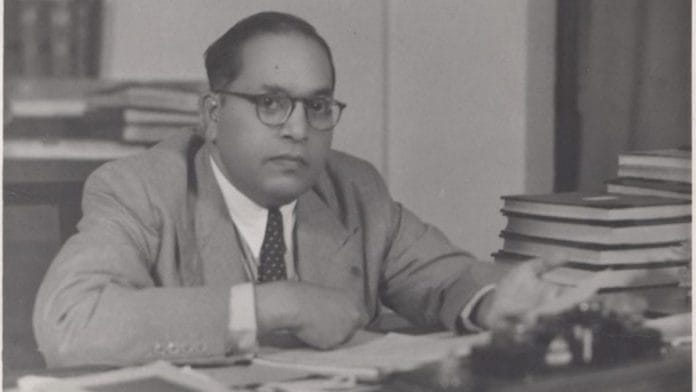Thank you dear subscribers, we are overwhelmed with your response.
Your Turn is a unique section from ThePrint featuring points of view from its subscribers. If you are a subscriber, have a point of view, please send it to us. If not, do subscribe here: https://theprint.in/subscribe/
As a country, India carries a unique weight of its identity. We habitually define our identity around caste, religion, gender, regional affiliations, and even language. As a result, any conversations around our identity are emotionally charged, making it difficult to navigate public discourse without stepping on our deeply held beliefs. It is not unusual for a movie, song, or even a poster to spark protests, or for officials to face backlash simply for not speaking the local language. Such a climate often stifles the open dialogue needed to resolve important political and cultural questions. Among the most difficult topics to discuss openly – precisely because it touches so many nerves – is our policy on reservations.
As compared to other nations with affirmative action policies, India’s reservation system stands out. This uniqueness stems from a structural feature that divides our population into five different social groups: General, OBC, SC, ST, and Muslims. Each group makes up anywhere between 15% and 35% of the population, with sharp variations across states and even districts. Because none of these groups hold overwhelming electoral power on their own, they tend to see themselves as a minority. This perception is further amplified by political strategies pitting one group against the other, often for electoral gains. Reserved categories often feel dominated by those in the general category, while many in the General category perceive reserved groups as encroaching on scarce opportunities in government jobs and education. This dynamic resurfaces with near predictability before every election, deepening social divisions and breeding a sense of insecurity across communities.
Given the profound impact of India’s reservation policy, it is astonishing how little public debate surrounds it. Surprisingly, this silence also extends equally to our media, parliament, and even our judiciary. It is important to clarify here, what “talking about reservations” means. On the face of it, we do talk about reservations, but those conversations are often limited to the electoral and political implications of our reservation policy. Very rarely, do we talk about the socio-economic impact of our reservation policy on people’s livelihoods, jobs, education, and change in caste-based inequality. It is understandable, why politicians avoid talking about reservations. Reserved categories’ votes are highly contested in any Indian elections, thus making any conversation around them politically sensitive. In fact, even mild references to reservation policy in the campaign leading up 2024 Lok Sabha elections were seen as contributing to BJP’s loss of majority in parliament.
What is most surprising, is how little our media talks about reservations. Coverage on the socio-economic impact of reservation in media has been few and far in-between. Left-leaning media always seem to favour reservations and often advocate for furthering our affirmative action policies. However, the moderate news media mostly seem to be noncommittal and even afraid to broach the topic. This hesitancy usually emanates from an acute fear of being canceled, boycotted, and condemned by the woke mob. This is exactly what happened in the case of Ms. Tavleen Singh when she argued for an end to the long-standing reservation policy.
Ironically, even the judiciary, which is supposed to protect our freedom of speech, has not been immune to the pressure of this woke mob. In 2015, 58 members of the Rajya Sabha approached the Vice President seeking impeachment proceedings against Justice J.B. Pardiwala (who is a minority) after he stated that “reservation and corruption are two things that have not allowed the country to progress in the right direction.” Under intense political pressure, Justice Pardiwala was compelled to apologize and withdraw his remark. Compare this to 2025, where we still haven’t seen much debate around impeachment even after hordes of cash were found in Justice Yashwant Verma’s house.
Which brings us to the elephant in the room: the caste census. While the caste census can be theoretically beneficial, it is driven by malicious motivations. Over the past few decades, India has been moving away from Mandal politics and with good reasons. Indians today are aspirational and want to feel respected irrespective of their caste. Caste census when conducted under the current political undercurrents will invariably re-open fault lines that exist in our societies. Moreover, it will provide a much stronger firepower to breach the 50 percent ceiling in our reservation policy. My problem with it, however, is that the reservation policy normalizes feudalism in India. If your surname determines your place in the world, why not social and political mobility? It normalizes the notion that your social mobility is determined more by your family name than your work – which is nothing but regressive.
I am sure many of us have strong opinions about reservations. Some of you might be strongly pro-reservations, while many would be against it. Reservations often evoke strong reactions from our country and with good reasons. Whatever your stand is, politics around reservations is always around the corner. If not the caste census, then your next state or central elections. These issues, as always will threaten to again divide our societies on caste lines. The only way to clear up some of this divide is to talk about reservations and I hope we start today.
These pieces are being published as they have been received – they have not been edited/fact-checked by ThePrint.


